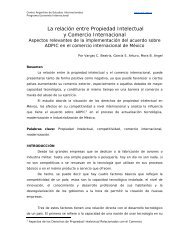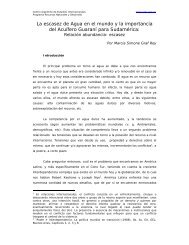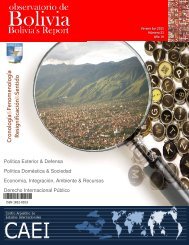Brazil's Defense Industry: The Emerging Transformational ... - CAEI
Brazil's Defense Industry: The Emerging Transformational ... - CAEI
Brazil's Defense Industry: The Emerging Transformational ... - CAEI
You also want an ePaper? Increase the reach of your titles
YUMPU automatically turns print PDFs into web optimized ePapers that Google loves.
satisfy capabilities requirements, inconsistencies and a lack of balanced stringency among<br />
requirements become apparent.<br />
This knowledge will be manipulated and transformed through the architecture of defense decisions.<br />
<strong>The</strong> requirements for new processes and products change constantly, yet the architecture of defense<br />
decisions change only with great deliberation and much effort. It is essential to ensure that the best<br />
decision in defense policy formulation be supported by coherent program-evaluation practices.<br />
This installment is even more prominent when making the costs and consequences of defense<br />
decisions as explicit as possible by insisting upon the use of the best practices to systematically<br />
validate capability requirements (field-test, games and simulations, etc.), ensuring that deficiencies<br />
uncovered are corrected with appropriate modifications, and compelling a rationale for defense<br />
expenditures fully integrated and balanced with defense programs.<br />
Multiple and simultaneous feed-back between the architecture of <strong>Defense</strong> decisions show how their<br />
processes are not truly neutral in that their substantive content affects the independence of the<br />
purposes they serve. As one, they belong to an elaborate complex of related activities that crystallize<br />
around a common goal – designing the appropriate composite of military capabilities. <strong>The</strong>ir great<br />
need is to make all operational processes work together, expanding and contracting their<br />
relationships as needs develop, managing knowledge through process networking on a vast scale in<br />
order to influence the powers that control it.<br />
Unless force design is addressed head on, choices offered by ministries to the political leadership are<br />
often either “more of the same” (easier and quicker than doing a comprehensive review) or are<br />
entirely new approaches that generally hinged imprudently on some form of “technology.”<br />
FRAMING THE WICKEDNESS OF THE PROBLEM<br />
Detailing the mechanisms by which large-scale changes in the defense industrial base occur has<br />
both macro and micro level explanations. However, even if the macro level explanation fits within the<br />
accepted economic frameworks, changes in the defense industrial base can only be properly<br />
explained by its micro foundations. Without a generally agreed upon theory or even a metatheory,<br />
structuring the defense industry problem from the dual perspective of security and development relies<br />
on strings of empirical patterns with varying degrees of correlation to hypothetical causes.<br />
<strong>The</strong> need for a clear defense industrial policy aligned with defense strategy has a new urgency<br />
caused by Brazil’s current position in international politics. Brazil possesses a margin of power over<br />
other regional states that need to be equated specifically military power. <strong>The</strong> choices Brazil makes<br />
now will affect not only its future position but also the course of regional integration for some time to<br />
come.<br />
Brazil’s ability to shape the region is now at its peak, but the future is not likely to be so rosy. Other<br />
states are growing restless due to Brazil’s predominant position and are likely to challenge it. Thus,<br />
the cost of its regional role is likely to rise. <strong>The</strong> challenge at this critical juncture for Brazil’s security is<br />
to decide what type of international role it wants defense to play. <strong>The</strong> prime directives of any defense<br />
strategy are, of course, how to protect the homeland and how to implement the role the country<br />
11<br />
Todos los derechos reservados. - Pág.<br />
11

















